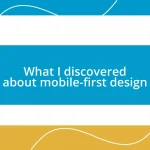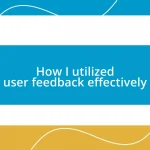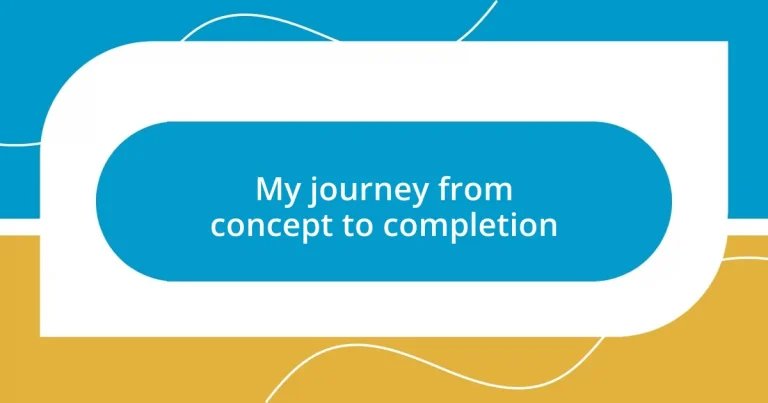Key takeaways:
- Embrace every step of the journey as valuable; small tasks pave the way for significant outcomes.
- View obstacles as opportunities for growth and learning, and seek feedback to enhance your project.
- Develop a flexible strategic plan with clear goals and regular check-ins to maintain momentum and encourage collaboration.
- Celebrate achievements to foster team bonds, express gratitude, and motivate for future projects.
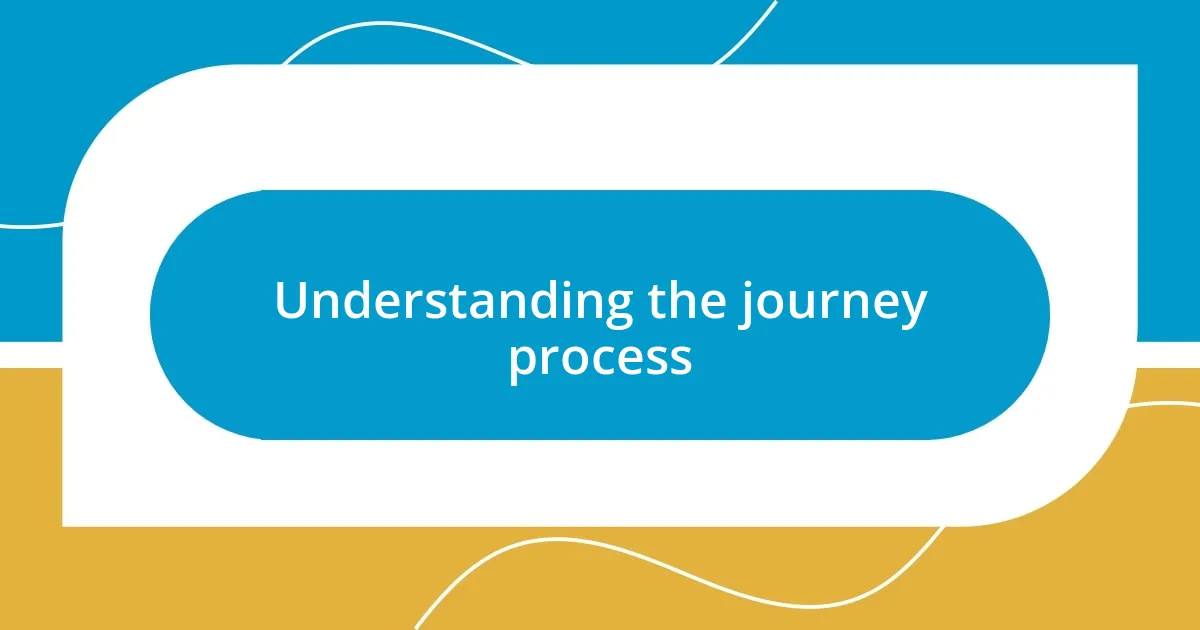
Understanding the journey process
Understanding the journey process is about recognizing that each step holds its own value. I remember feeling overwhelmed at the start of a project, unsure of where to begin. It hit me then: every great outcome is the result of tackling one small task at a time. Isn’t it fascinating how breaking it down can make the overwhelming feel manageable?
As I progressed through my journey, I discovered that setbacks were often my greatest teachers. There was a point when I faced a major hurdle, and it felt as if progress had stalled. Reflecting on that moment, it became clear to me how essential it is to embrace these bumps along the way, as they hone our skills and build resilience. How often do we dismiss our struggles without appreciating their role in our growth?
Engaging with the journey process also requires a mindset shift: from seeing obstacles as barriers to viewing them as opportunities. I recall a time when feedback from peers felt more like criticism than constructive input. However, re-framing my perspective allowed me to welcome their insights, enriching my experience. What if we all viewed feedback as a stepping stone rather than a stumbling block? That shift can indeed transform our entire journey.
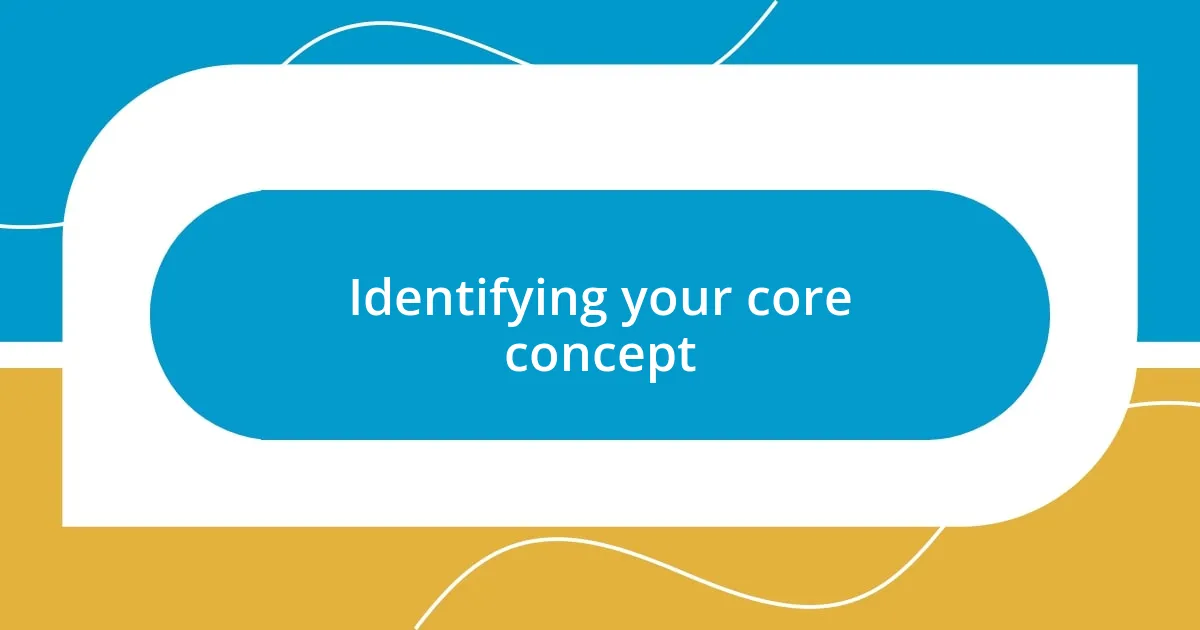
Identifying your core concept
Identifying your core concept is like finding the heart of your project. It took me some trial and error to really grasp what I wanted to achieve. At one point, I jotted down a flurry of ideas on sticky notes, hoping to uncover the essence of my vision. Looking back, I appreciate how that chaotic brainstorming session helped me filter out the noise and focus on what truly resonated with me.
To help clarify your core concept, consider these key steps:
- Reflect on your passions: What excites you? List ideas that set your heart racing.
- Define your audience: Who will benefit from your project? Understanding their needs can steer your focus.
- Research existing solutions: What’s already out there? Analyzing competitors can reveal gaps in the market.
- Seek feedback: Genuine opinions from others can provide a fresh perspective and help crystalize your thoughts.
In my experience, engaging with these steps brought clarity and purpose to my project, paving the way for a more focused approach.
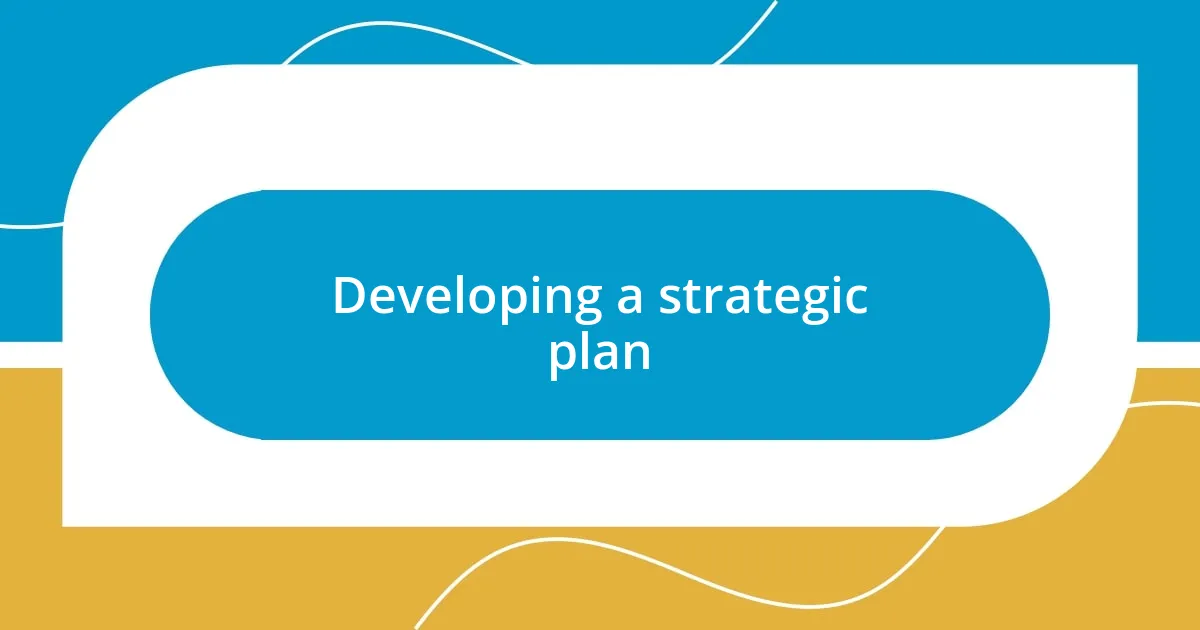
Developing a strategic plan
Developing a strategic plan is the backbone of any successful project. I vividly remember when I first set out to create my strategy; it felt like charting unknown waters. I started by outlining clear goals and breaking them into manageable milestones. This approach transformed an intimidating process into a series of achievable steps that kept me motivated. Have you ever felt lost in a project? With a structured plan, I’ve found my way through those moments of confusion.
As I refined my strategy, I embraced the importance of flexibility. There were times when my original plan didn’t align with emerging insights or unexpected challenges. I recall a crucial pivot during a project that demanded I reassess my resources and timelines. It was daunting, but adapting my strategy not only salvaged the project but also enriched my understanding of its potential. Isn’t it surprising how the willingness to adjust can sometimes lead to even better outcomes?
Incorporating feedback was another vital aspect of my strategic planning process. I often sought input from peers, which, at times, felt intimidating. But looking back, those discussions were invaluable. For instance, after a brainstorming session where colleagues presented alternative viewpoints, my initial direction shifted dramatically. I learned that collaboration and transparency can significantly enhance strategic outcomes. Isn’t that a revelation about the power of teamwork?
| Key Aspect | Personal Experience |
|---|---|
| Clear Goals | Breaking down objectives into milestones made the process less daunting and more achievable. |
| Flexibility | Adjusting my strategy based on new insights often led to improved project outcomes. |
| Feedback | Engaging with others and embracing their perspectives enriched my project understanding. |
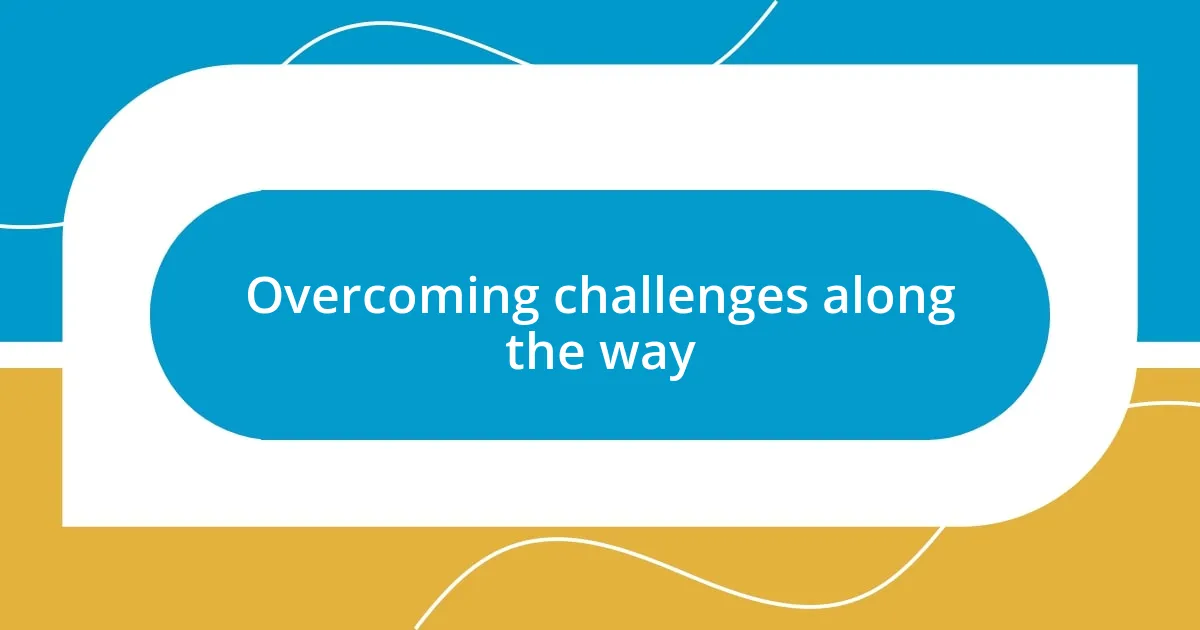
Overcoming challenges along the way
I’ve encountered various challenges throughout my journey, and each one tested my resilience in unique ways. One memorable hurdle was the moment I realized that a critical aspect of my project just wasn’t working. I distinctly recall sitting at my desk, feeling that familiar pang of frustration. Instead of letting it overwhelm me, I decided to approach it differently. I took a step back, regrouped, and brainstormed alternative solutions. Why do we often forget that sometimes pausing to reflect can be more productive than pushing through a dead end?
Another significant challenge arose from self-doubt. There were days when I questioned whether I was truly equipped to see this project through. I vividly remember sharing my fears with a mentor, who reminded me of the value of vulnerability. It made me realize that embracing my uncertainties could actually foster personal growth. In that moment, I learned that overcoming challenges often requires reaching out and leaning on the support of others. Isn’t it fascinating how sharing our insecurities can lighten the load?
Technological setbacks were also a regular part of my journey. I faced numerous late nights wrestling with software glitches and connectivity issues, often wondering if I was in over my head. Yet, each time I encountered these obstacles, it served as a reminder of the importance of perseverance. I learned to view these moments not as failures but as invitations to learn and adapt. How many times have you faced a similar tech hiccup and thought, “I can’t do this,” only to surprise yourself with a solution? Embracing these challenges forged a deeper connection between my skills and the project itself.
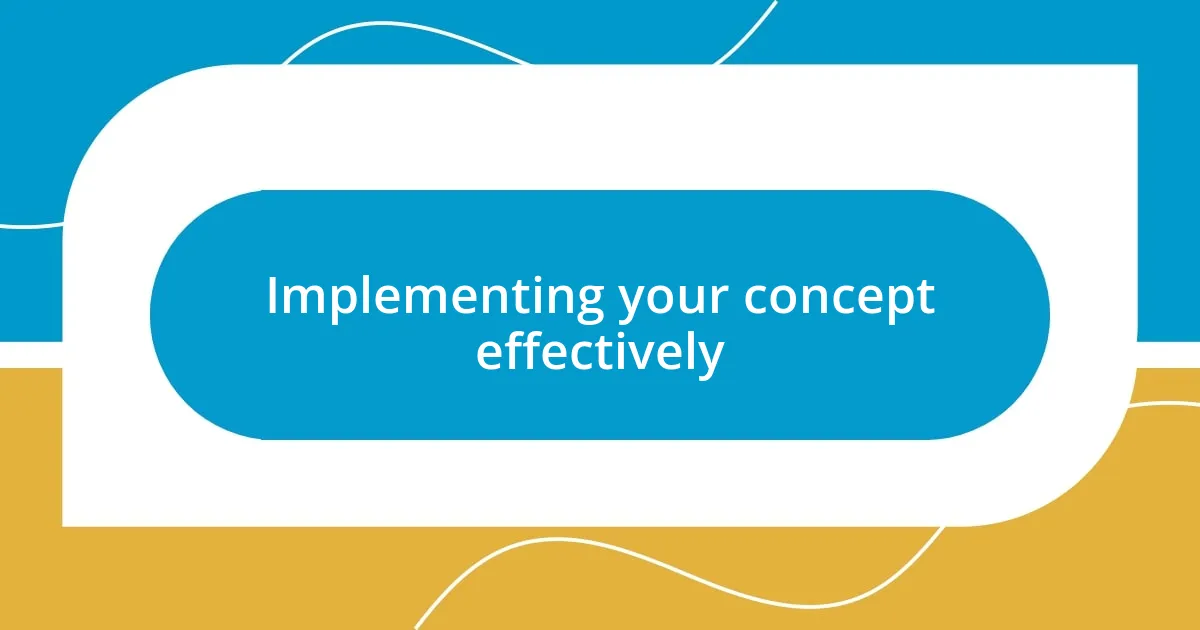
Implementing your concept effectively
Implementing your concept effectively requires a detailed understanding of the resources at your disposal. I still remember my first major project where I underestimated the importance of aligning my team’s skills with the tasks at hand. Those initial missteps taught me that having the right people in the right roles can make all the difference. Have you ever had a team member whose strengths didn’t match their assigned tasks? The transformation I witnessed when I reshuffled roles based on individual talents was game-changing. It reinforced my belief that effective implementation hinges on recognizing and utilizing the unique capabilities of each team member.
Adopting the right tools can also streamline your project’s execution. Early in my journey, I grappled with managing tasks manually, which led to disorganization and lost momentum. Transitioning to project management software was a revelation. It was like flipping a switch; I could visualize the entire project timeline and keep everyone on the same page. Have you experienced that “aha” moment when you find the perfect tool? Finding the right technology not only simplified communication but also fostered a sense of unity among team members. I truly believe that the right tools can elevate a concept from mere ideas to tangible results.
Lastly, I’ve learned that regular check-ins are crucial for staying on track. In one instance, I implemented weekly meetings where we could discuss progress and address roadblocks. Initially, I thought those sessions would feel redundant or time-consuming, yet they turned out to be essential for maintaining momentum. The candid conversations not only kept everyone accountable but also nurtured a culture of openness and collaboration. Don’t you think having a platform for regular feedback could enhance your project’s success? In my experience, these discussions often spark fresh ideas and keep the project aligned with its goals.
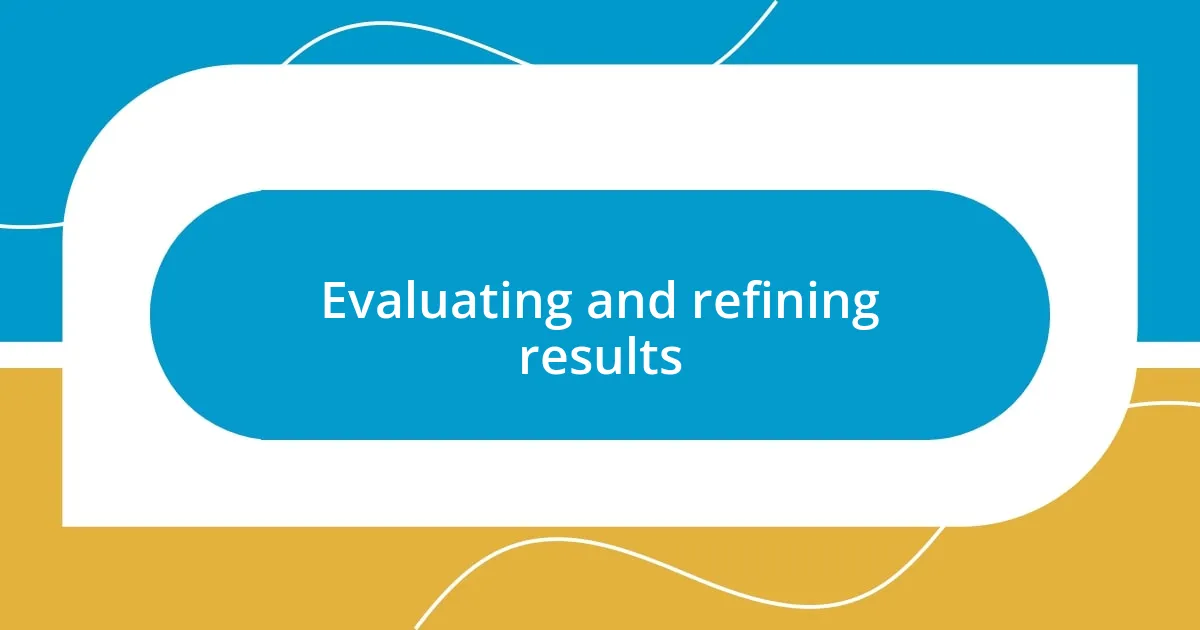
Evaluating and refining results
Assessing outcomes can be an eye-opening experience. There was a moment when I reviewed the progress of my project, only to discover areas that didn’t meet my expectations. I felt a mix of disappointment and determination wash over me. Instead of dwelling on what went wrong, I dove deeper. That process of evaluating my results revealed invaluable lessons that shaped the next steps. Don’t you ever feel that a setback can spark an even greater motivation to improve?
I found that a clear framework for evaluation makes a big difference. During one project, I created a checklist to assess each component thoroughly. This small strategy helped uncover essential insights, driving me to refine my work continuously. That’s the beauty of evaluation — it’s not just about pinpointing errors; it’s about identifying opportunities for development. How often do you pause to reflect on your progress? For me, it became a critical practice that ignited new creativity in my endeavors.
One invaluable takeaway from my evaluation experience was the importance of collaboration. When I shared my results with peers, their perspectives provided clarity that I had overlooked. I recall one colleague’s suggestion, which turned a so-so aspect into a standout feature. Those moments made me realize that when you evaluate and invite feedback, you’re not just refining results; you’re weaving a richer tapestry of ideas. Isn’t it amazing how collaboration can transform our vision into something greater than we originally imagined?
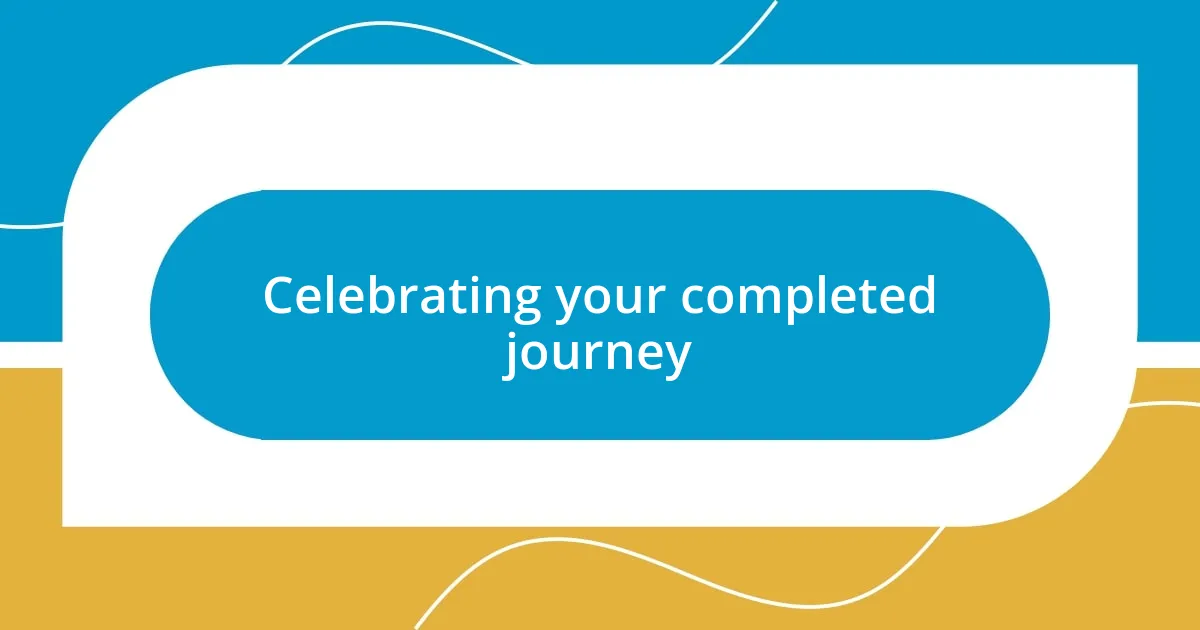
Celebrating your completed journey
Celebrating your accomplishments is more than just a moment of joy; it’s a powerful way to acknowledge the hard work and dedication that brought your vision to life. I recall the day I completed a particularly challenging project—it felt surreal. I gathered my team and we toasted to our success, relishing in the sense of triumph together. Have you experienced that rush when you see your idea fully realized? There’s something exhilarating about sharing that moment with the people who helped shape it.
As we celebrated, I noticed how it also reinforced our bonds. Each person brought unique skills to the table, and recognizing that collective effort made us feel like a cohesive unit. I’ve learned that these celebrations foster gratitude and motivation. When was the last time you took a pause to appreciate your journey? I believe it’s essential to create those moments—whether it’s a simple gathering, a shoutout in a meeting, or even treating yourself to something special. They remind us of the significance of our work, promoting a culture of recognition and encouragement.
Looking back, I realize that reflecting on these achievements can naturally guide your next steps. It helps you understand your strengths and areas for growth. After my biggest project, I took a moment to jot down what worked well and what I wanted to improve for the future. This practice not only helped in planning subsequent projects but also motivated me to aim even higher. How do you celebrate your victories? For me, celebrating isn’t just a conclusion; it’s an invitation to embrace new challenges with renewed energy and excitement.


